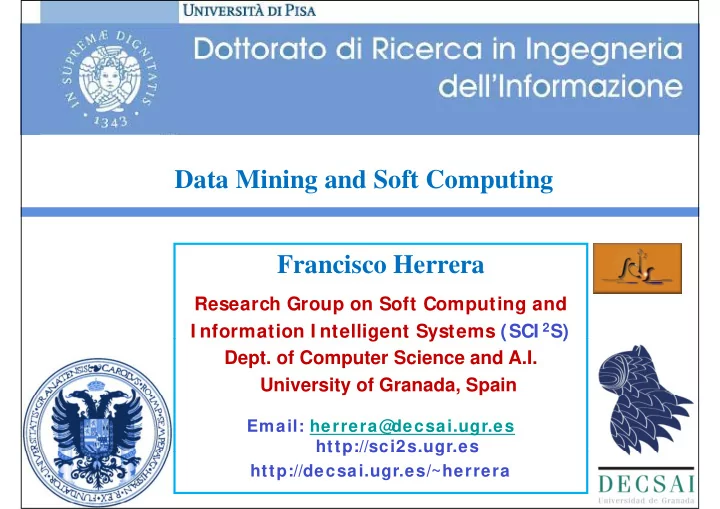

Data Mining and Soft Computing Francisco Herrera Research Group on Soft Computing and I nformation I ntelligent Systems (SCI 2 S) g y ( ) Dept. of Computer Science and A.I. University of Granada, Spain Email: herrera@ decsai.ugr.es http://sci2s.ugr.es http://sci2s.ugr.es http://decsai.ugr.es/~herrera
Data Mining and Soft Computing Data Mining and Soft Computing In this course: We will introduce the Data Mining and Knowledge Discovery area: steps, task, K l d Di t t k challenges .. We will introduce Soft Computing techniques: p g q Fuzzy Logic, Genetic Algorithms, … … and we will present the use of Soft Computing tecniques in Data Mining 2
Data Mining and Soft Computing Data Mining and Soft Computing Material of this course at: http://sci2s.ugr.es/docencia/asignatura.php?id_asignatura=14 3
Data Mining and Soft Computing Data Mining and Soft Computing � Data mining: � Data mining: � Extraction of interesting (non-trivial, implicit, previously unknown and potentially useful ) i l k d t ti ll f l ) information or patterns from data in large databases Knowledge K l d Patterns Patterns Target Processed d t data data Interpretation Evaluation Evaluation Data Mining data P Preprocessing i & cleaning 4 Selection
Data Mining Data Mining How can I analyze this data? Knowledge We have rich data, Data mining-searching for knowledge but poor information (interesting patterns) in your data. g p y J. Han, M. Kamber. Data Mining. Concepts and Techniques 5 Morgan Kaufmann, 2006 (Second Edition)
S f C Soft Computing i Soft computing refers to a collection of computational techniques in Soft computing refers to a collection of computational techniques in computer science, machine learning and some engineering disciplines, which study, model, and analyze very complex phenomena: those for which more conventional methods have not yielded low cost, analytic, and ti l th d h t i ld d l t l ti d complete solutions. Prof. Zadeh: "...in contrast to traditional hard computing, soft computing exploits the tolerance for imprecision, uncertainty, and partial truth to i i i i d i l h achieve tractability, robustness, low solution- cost, and better rapport with reality” , pp y Lotfi A. Zadeh Introduce “Fuzzy Logic” in 1965 and “Soft Computing” 6 in 1992.
C Computational Intelligence t ti l I t lli The Field of Interest of the Society shall be the theory, design, application, and development of biologically d i li ti d d l t f bi l i ll and linguistically motivated computational paradigms emphasizing neural networks connectionist systems emphasizing neural networks, connectionist systems, genetic algorithms, evolutionary programming, fuzzy systems, and hybrid intelligent systems in which these y , y g y paradigms are contained. 7
Data Mining and Soft Computing Data Mining and Soft Computing � Contents: P Part I. Principles of Data Mining t I P i i l f D t Mi i � Introd ction to Data Mining and Kno ledge � Introduction to Data Mining and Knowledge Discovery � Data Preparation � Introduction to Prediction, Classification, Clustering and Association � Data Mining - From the Top 10 Algorithms to the New Challenges Challenges 8
Data Mining and Soft Computing Data Mining and Soft Computing � Contents: P Part II. Soft Computing Techniques in Data Mining t II S ft C ti T h i i D t Mi i � Introduction to Soft Computing. Focusing our � Introd ction to Soft Comp ting Foc sing o r attention in Fuzzy Logic and Evolutionary Computation Computation � Soft Computing Techniques in Data Mining: Fuzzy � Soft Computing Techniques in Data Mining: Fuzzy Data Mining and Knowledge Extraction based on Evolutionary Learning Evolutionary Learning � Genetic Fuzzy Systems: State of the Art and New Trends 9
Data Mining and Soft Computing Data Mining and Soft Computing � Contents: Part III. Data Mining: Some Advanced Topics P t III D t Mi i S Ad d T i � Some Advanced Topics I: Classification with � Some Ad anced Topics I Classification ith Imbalanced Data Sets � Some Advanced Topics II: Subgroup Discovery � Some advanced Topics III: Data Complexity � Final talk: How must I Do my Experimental Study? Design of Experiments in Data Mining/ Computational Intelligence. Using Non-parametric 10 Tests. Some Cases of Study.
Bibliography Bibliography J Han M Kamber J. Han, M. Kamber. Data Mining. Concepts and Techniques Morgan Kaufmann, 2006 (Second Edition) http://www.cs.sfu.ca/~han/dmbook I.H. Witten, E. Frank. Data Mining: Practical Machine Learning Tools and Techniques, Second Edition,Morgan Kaufmann, 2005. http://www.cs.waikato.ac.nz/~ml/weka/book.html p Pang-Ning Tan, Michael Steinbach, and Vipin Kumar Introduction to Data Mining (First Edition) Addison Wesley, (May 2, 2005) Addi W l (M 2 2005) http://www-users.cs.umn.edu/~kumar/dmbook/index.php Dorian Pyle Data Preparation for Data Mining Morgan Kaufmann, Mar 15, 1999 Mamdouh Refaat Mamdouh Refaat Data Preparation for Data Mining Using SAS Morgan Kaufmann, Sep. 29, 2006) 11
Data Mining and Soft Computing Summary 1. Introduction to Data Mining and Knowledge Discovery 2. Data Preparation 3. Introduction to Prediction, Classification, Clustering and Association 3. Introduction to Prediction, Classification, Clustering and Association 4. Data Mining - From the Top 10 Algorithms to the New Challenges 5. Introduction to Soft Computing. Focusing our attention in Fuzzy Logic and Evolutionary Computation and Evolutionary Computation 6. Soft Computing Techniques in Data Mining: Fuzzy Data Mining and Knowledge Extraction based on Evolutionary Learning 7. Genetic Fuzzy Systems: State of the Art and New Trends 7 G ti F S t St t f th A t d N T d 8. Some Advanced Topics I: Classification with Imbalanced Data Sets 9. Some Advanced Topics II: Subgroup Discovery 10.Some advanced Topics III: Data Complexity 11.Final talk: How must I Do my Experimental Study? Design of Experiments in Data Mining/Computational Intelligence. Using Non- p g p g g parametric Tests. Some Cases of Study.
Recommend
More recommend